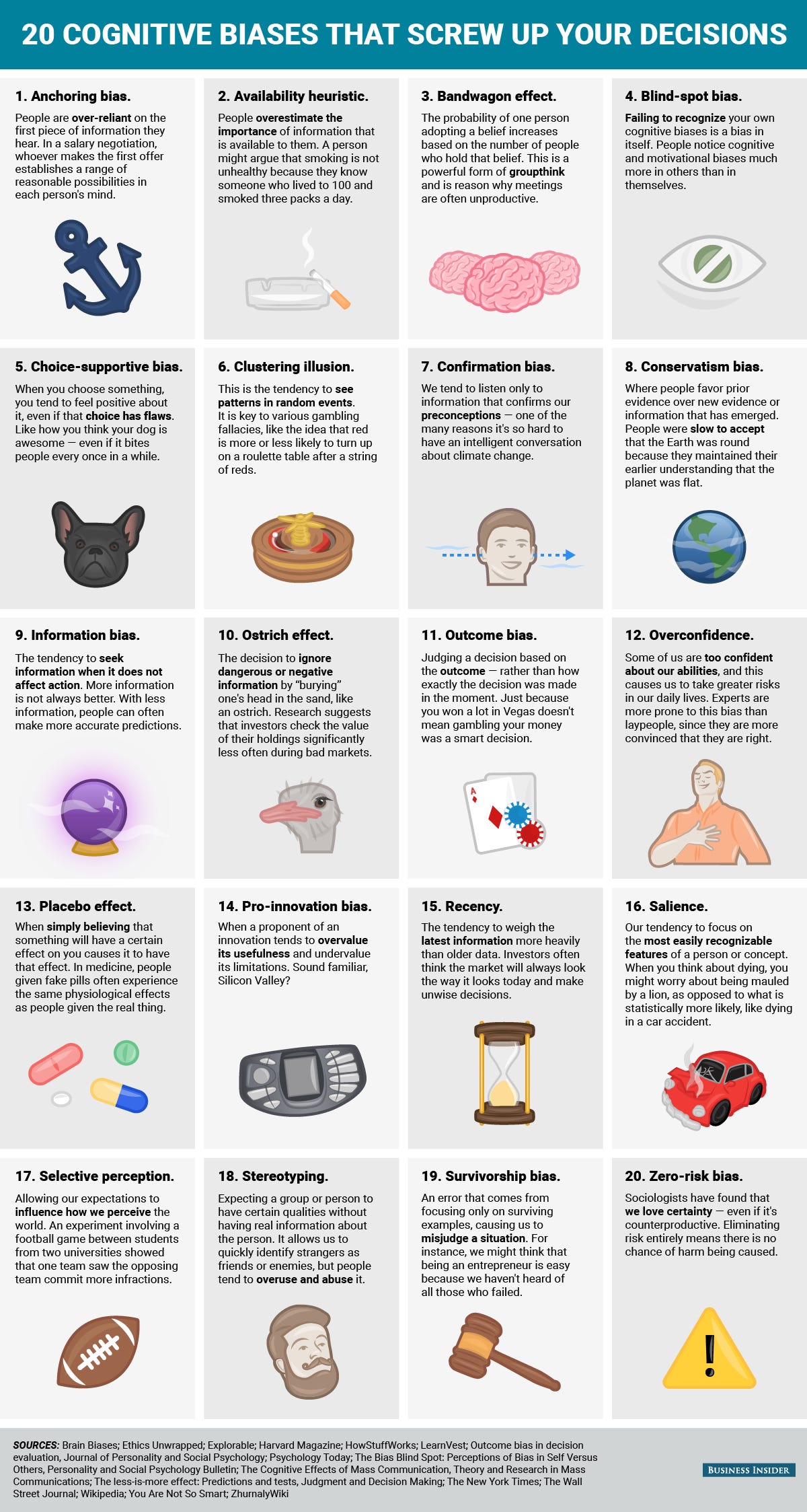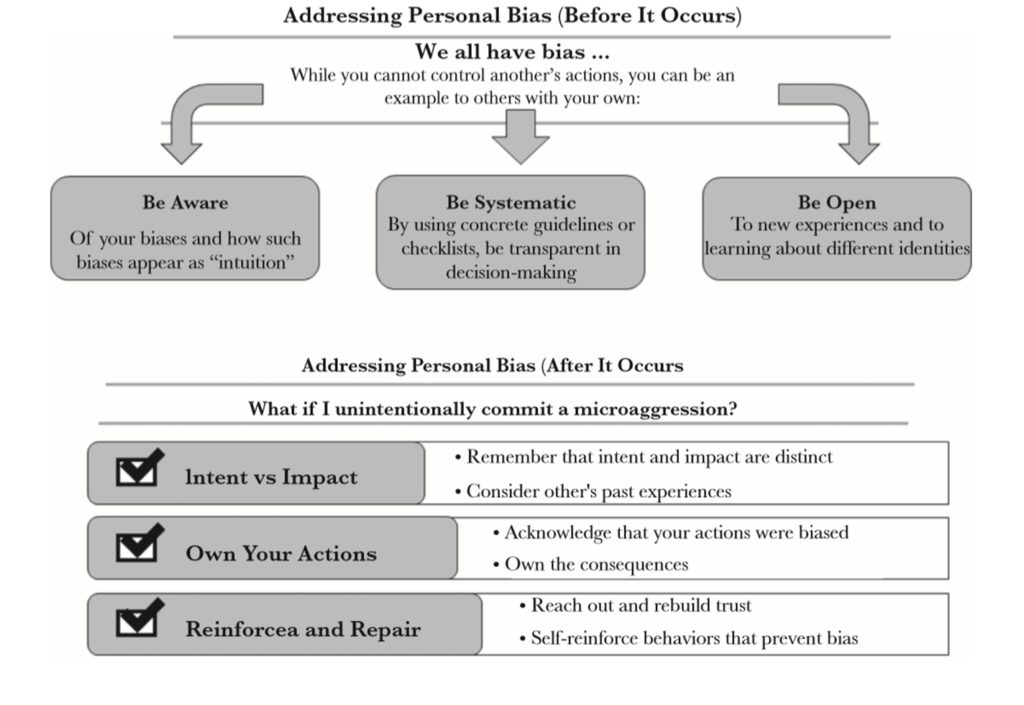Key concepts
Before exploring decolonisation you might find it useful to make sure you understand a few important concepts. These underpin a lot of the work of decolonisation, but they are not themselves decolonial. Here we offer a short introduction, but to expand your knowledge further you should explore the UoB resources section below and the Decolonise BMS reading list
What is unconscious bias?
Unconscious bias is an interesting and sometimes quite controversial topic. These cognitive biases shape how we interpret the world around us, and how we react to people and events. They are inherently powerful, and sometimes difficult to navigate. The example image below includes 20 different kinds of cognitive bias alone.

What all forms of unconscious bias have in common is that they are decisions which are made quickly and are formed from a place of prejudice. “Thinking, fast and slow” by Daniel Khaneman is an interesting exploration of this topic, and argues for why we should slow our thinking down to be more deliberative and reflective. You can find a link to this in the DecoloniseBMS reading list, or watch an interview with the author here.
It is important to recognise that unconscious bias is different to conscious bias, but once we become aware of bias we must make a choice to challenge it. Similarly, just because a bias is unconscious it does not minimise the harm it might cause, and how we must respond when we become aware of our impact. As you explore ideas of decolonisation you will come to realise that the examination of both conscious and unconscious bias is essential to unpicking the structures which create a colonised curriculum and culture of learning.
Below is a useful flow diagram from The Impact of Unconscious Bias in Healthcare: How to Recognize and Mitigate It (2019), by Marcelin et al. Importantly it works from a starting point of acknowledging bias exists, and despite our best intentions at some point it will impact our behaviours and decision making. One critique of this model, however, is the over reliance on systemic guidelines and structures, as this ignores that these are made by people who are themselves subject to bias. Whilst a useful tool for transparent decision making, we should also be ready and open to critiquing the systems in which we work and teach, a vital part of decolonial thinking.

If you are interested in testing your own possible implicit forms of bias you can visit the Harvard Implicit Association Test. This can be used to stimulate thought and reflection, but shouldn’t be used in isolation to reflect on the bias you hold.
Finally a useful video which discusses the important powerful ways that unconscious bias can manifest, and how we can begin to combat it, can be seen below.
What is intersectionality and why is it important?
Understanding the idea of intersectionality is vital. Whilst it can help to break down acts of discrimination and individual’s identities into categories when we are learning about them, for instance “that is racism” or “that is sexism”, the fact is that these categories often overlap, and that marginalised people may be trapped by these powerful overlapping forces of oppression.
Coined in 1989 by Kimberlé Crenshaw, a legal scholar and civil rights activist, it was used to describe how Black women were left out of anti-racist and feminist discussions. Crenshaw argued that these narratives failed to understand the unique experiences generated by the overlapping oppression of racism and sexism. As such the solutions and actions that were designed to combat these oppressions failed to support Black women.
We can expand this to consider the experiences of LGBTQ+ disabled people accessing healthcare, or older racialised people applying for work. The discrimination they experience is not simply “racism” or “ageism” or “queerphobia”, it is a complex interlocking social dynamic that creates similarly interlocking barriers. Therefore when we explore decolonisation, which includes considering whose voices and stories are missing within our curriculums, we must remember that the solutions we propose should be as authentically nuanced as the people they represent. You can watch an interesting video on intersectionality below.
You can also watch a longer keynote speech from Crenshaw below.
UoB Specific Resources
Below are a list of internal UoB resources which can be used to support your work in both decolonisation and anti-racism. We recommend starting your education looking at these resources from UoB, and then exploring the collections of videos in “Resources on decolonisation”, before thinking more about more subject specific awareness as applied to your own teaching when you feel more confident:
- Bristol Institute for Learning and Teaching – Decolonising Interview Series
- Disrupting Racism – The Disrupting Racism programme is designed to support all of us on our journey towards becoming an anti-racist University
- Postgraduate Certificate in Academic Practice – Training for new staff which will include important conversations related inclusive pedagogy
- CREATE (Cultivating Research-rich Education and Teaching Excellence) – HEA Fellowship scheme also incudes important conversations on bias, decolonisation and inclusive pedagogy
It is also worth noting that within BMS we currently offer a Bias and Bystander Skills training course, delivered by BMS faculty for BMS faculty. Advertisements for this course will appear as regular standing items within the school bulletin, but if you wish to explore some online content about this topic a sway which accompanies this teaching can be found here Bias and Bystander Skills
There is also a Decolonise UoB reading group organised by BILT, which can be accessed here.
Resources on decolonisation
Decolonisation is a deliberatively disruptive process, that seeks to unpick entrenched ways of thinking, behaving and viewing the world. Anything disruptive is by its very nature not a comfortable experience, therefore for many people the re-examinations of their specialities and teaching is inherently an uncomfortable process. However, that sense of discomfort is important. If unpicking our assumptions, our bias and our frameworks of practice were easy then it would suggest we are not being reflective enough. Therefore this section aims to provide you with some resources that will ground you in understanding the logic and basic theory of decolonisation, before you then seek to explore this more specifically within your own domain. We recommend taking your time to do this, but this foundational awareness is something you should revisit often and refresh.
Top tip: Don’t do this alone. Find peers in your department/speciality who can explore these topics with you. Stimulate your learning with reflection and shared understanding.
We suggest to begin you explore the following videos. These are useful to stimulate your thinking about the idea of decolonisation, and also how discussions of race and racism might fit within curriculums. If you wish to start with reading rather than videos you can view the Decolonise BMS reading list, and look to essential reading, or perhaps start with Lokugamage, Ahillan and Pathberiya (2020) Decolonising ideas of healing in medical education.
Useful videos
The first video is from the 2020 University of Bristol event which discussed the importance of critical engagement with the ways in which the knowledge and resources we encounter at university are shaped by the impact of colonial power structures, and how we create solutions which address racism and colonial legacies in our university
Hopefully this video has equipped you with some basic knowledge of decolonisation and how it is being approached within the University of Bristol. Now let’s consider this more specifically applied to medicine, and hear from medical student Eva Larkai being interviewed as part of the UoB Future Learn course.
The next video is a short extract from a longer talk by Dr Charles W. Mills critically exploring the concept of race, and how it exists as a social construct.
This final video explores the idea of race conscious medicine, which can be explored further in the Lancet paper “From race-based to race-conscious medicine: how anti-racist uprisings call us to act“. This is an important way to reframe the ideas of biological assumptions we see related to race, and how we might change medical practice in light of these re-examinations.